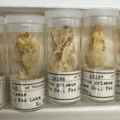HaloTag technology represents a versatile tool for studying proteins. Fluorescent HaloTag ligands employed in sequential labeling led to the discovery of distinct protein variants for histones, cohesins, and MCM complexes. However, an efficient biochemical approach to separate these distinct protein variants to study their biological functions is missing. Principally, being a gap in technology, the HaloTag toolbox lacks affinity ligands displaying good cell permeability and efficient affinity capture. Here, we describe the design, synthesis, and validation of a new cell-permeable biotin-HaloTag ligand, which allows rapid labeling of Halo-tagged proteins in live cells and their efficient separation using streptavidin pull-down. We provide a proof-of-concept application of how to use the herein-developed affinity ligand in sequential labeling to biochemically separate protein variants and study their biological properties. This approach enables to address fundamental questions concerning essential cellular processes, including genome duplication and chromatin maintenance.







No Comments
Leave a comment Cancel